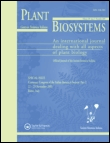
PLANT BIOSYSTEMS
Scope & Guideline
Illuminating the Pathways of Plant Interactions and Adaptations
Introduction
Aims and Scopes
- Biodiversity and Conservation:
The journal focuses on the diversity of plant species and their conservation status, addressing global challenges such as habitat loss and climate change. Research includes assessments of endangered species, red lists, and conservation strategies. - Plant Physiology and Biochemistry:
Studies on plant physiology, including responses to environmental stressors, physiological adaptations, and biochemical pathways are central to the journal's scope. This includes research on secondary metabolites and their roles in plant defense and health. - Ecological Interactions:
Research exploring the interactions between plants and their environments, including mycorrhizal associations, allelopathy, and plant-animal interactions, is emphasized. This includes ecological assessments and the impact of invasive species. - Ethnobotany and Traditional Knowledge:
The journal highlights the importance of traditional plant knowledge and its applications in medicine and agriculture, documenting the use of native plants by indigenous communities. - Taxonomy and Phylogenetics:
Taxonomic studies and phylogenetic analyses are crucial for understanding plant relationships and the evolutionary history of plant groups, including descriptions of new species and revisions of existing taxa. - Applied Plant Sciences:
Research that has practical applications, such as improving agricultural practices, developing sustainable management strategies, and exploring bioactive compounds for medicinal use, is also a significant focus.
Trending and Emerging
- Climate Change Adaptation:
Research focusing on how plant species adapt to changing climatic conditions is on the rise. This includes studies on phenological changes, habitat suitability modeling, and stress responses, highlighting the urgency of understanding plant resilience. - Bioprospecting for Bioactive Compounds:
There is a growing interest in the exploration of plant-derived bioactive compounds for pharmaceutical and agricultural applications. This includes studies on phytochemicals with antioxidant, antimicrobial, and anticancer properties. - Technological Integration in Plant Studies:
The integration of advanced technologies such as machine learning, genomic sequencing, and metabolomics is increasingly evident. This trend is enhancing the depth and scope of research, enabling more sophisticated analyses of plant biology. - Restoration Ecology:
Research focused on plant restoration and rehabilitation of degraded ecosystems is gaining attention. This includes studies on native species reintroduction, habitat restoration, and the ecological implications of plant community dynamics. - Ethnobotany and Sustainable Practices:
The exploration of traditional knowledge related to plant use and its implications for sustainable practices is emerging as a significant theme. Researchers are increasingly documenting indigenous practices and their relevance in contemporary conservation efforts.
Declining or Waning
- Traditional Agricultural Practices:
Research centered solely on traditional agricultural practices without integration of modern techniques or sustainability aspects seems to be less frequent. There is a growing emphasis on innovative agricultural methods, including biotechnology and sustainable practices. - Purely Descriptive Taxonomy:
While taxonomy remains important, there is a noticeable decline in purely descriptive taxonomic studies lacking molecular or ecological context. The trend is shifting towards integrative approaches that combine morphological, molecular, and ecological data. - Invasive Species Management without Ecological Context:
Studies focusing on invasive species management that do not incorporate ecological implications or interactions with native species are becoming less common. The journal is increasingly prioritizing research that considers broader ecological impacts.
Similar Journals

Plants-Basel
Connecting researchers to the world of plant science.Plants-Basel is a distinguished open access journal published by MDPI since 2012, offering a comprehensive platform for researchers and professionals in the field of ecology, plant science, and evolutionary biology. Based in Switzerland, this journal has established itself as a leader in disseminating high-quality research, evident through its impressive rankings in multiple categories, including Q1 in Ecology and Plant Science for 2023. With a substantial impact factor and a dedicated focus on advancing our understanding of plant interactions, ecosystems, and sustainable practices, Plants-Basel is vital for scholars seeking to contribute to these critical fields. The journal's commitment to open access enhances visibility and accessibility, facilitating the widespread sharing of knowledge essential for addressing contemporary ecological challenges.

ACTA SOCIETATIS BOTANICORUM POLONIAE
Cultivating Insights for a Greener TomorrowACTA SOCIETATIS BOTANICORUM POLONIAE is a reputable open-access journal dedicated to the field of Plant Science, published by the Polskie Towarzystwo Botaniczne since 1923. With an ISSN of 0001-6977 and an E-ISSN of 2083-9480, this journal has made significant contributions to the botanical sciences, fostering the dissemination of research from Poland and beyond. The journal has ranked in the third quartile (Q3) within its category in the 2023 journal metrics, demonstrating a strong presence in the global academic community, as evidenced by its Scopus ranking of 291/516 within the Agricultural and Biological Sciences sector, placing it in the 43rd percentile. While specific H-Index data are currently not available, ACTA continues to attract submissions from a broad international audience and publishes a wide range of studies that advance the understanding of plant biology, ecology, and conservation. The journal remains a vital resource for researchers, professionals, and students alike, committed to enhancing knowledge and collaboration in botanical science.
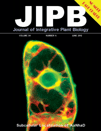
Journal of Integrative Plant Biology
Unveiling the Complexities of Plant LifeThe Journal of Integrative Plant Biology, published by WILEY, is a premier academic journal that has been at the forefront of advancing research in plant biology since its inception in 2005. With a notable impact factor and a robust Scopus ranking—positioned at #7 out of 516 in Plant Science and #18 out of 438 in Biochemistry—this journal is recognized as a Q1 journal in multiple categories, including Biochemistry and Plant Science. The journal aims to bridge the gaps between various disciplines in plant research, emphasizing integrative and interdisciplinary approaches to understanding plant biology. With options for open access, the Journal of Integrative Plant Biology ensures broad visibility and impact of research findings, making it an invaluable resource for researchers, professionals, and students looking to stay informed on innovative advancements in the field. Its headquarters are located in the United Kingdom, further amplifying its reach within the global academic community.

Botanical Sciences
Championing open access for the advancement of plant sciences.Botanical Sciences, published by SOC BOTANICA MEXICO, is a pioneering open access journal dedicated to advancing the field of plant science. Established in 2012, it has rapidly become an essential resource for researchers and professionals interested in the diverse aspects of botany, including plant biology, ecology, and conservation. With an ISSN of 2007-4298 and an E-ISSN of 2007-4476, the journal operates under a vision to foster the exchange of knowledge and innovations among scientists globally. Recognized in the Q3 quartile for plant science in 2023 and ranking at #304 out of 516 in the Scopus category for Agricultural and Biological Sciences, Botanical Sciences is strategically positioned to widen its reach and impact. The journal's commitment to open access ensures that research findings are freely available to an international audience, providing invaluable insights and fostering collaboration within the botanical sciences community. The editorial board comprises leading experts who are dedicated to maintaining high-quality peer review processes to uphold the standards expected by the academic community.
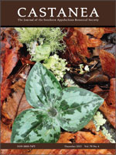
CASTANEA
Cultivating a Deeper Understanding of Our Natural WorldCASTANEA is a distinguished journal published by the SOUTHERN APPALACHIAN BOTANICAL SOCIETY in affiliation with NEWBERRY COLLEGE. With an ISSN of 0008-7475 and an E-ISSN of 1938-4386, this esteemed publication serves as a vital platform for researchers and practitioners in the field of Plant Science. It has been circulating since 1982, and its scope focuses on the study of trees, their ecology, and conservation, thereby contributing significant insights into the biodiversity of the Southern Appalachian region and beyond. Despite its current ranking in the Q4 quartile and the 5th percentile in the Scopus Agricultural and Biological Sciences category, CASTANEA is committed to advancing knowledge and fostering a deeper understanding of plant sciences among academics and students alike. The journal does not currently offer Open Access options, maintaining a traditional subscription model that allows for carefully curated and peer-reviewed content. As you explore the advances in plant biology through CASTANEA, you will find an invaluable resource that supports both emerging and established scholars in their research endeavors.

Acta Botanica Mexicana
Elevating botanical studies with quality research.Acta Botanica Mexicana is a premier journal published by Instituto de Ecología AC, dedicated to advancing research in the fields of ecology, plant science, and biological sciences. With an E-ISSN of 2448-7589, this open-access journal facilitates extensive dissemination of scientific findings, ensuring that knowledge is accessible to researchers, professionals, and students worldwide. Established in 2008, Acta Botanica Mexicana has earned a notable reputation, achieving a Q3 ranking in plant science and a Q4 ranking in ecology and evolution for 2023. This positioning underscores its commitment to publishing high-quality research that addresses vital issues in ecological and botanical studies. With a focus on innovative methodologies and pragmatic solutions, the journal invites contributors to share their insights and findings, thus enriching the academic landscape and fostering collaborations that drive the field forward. The journal is based in Michoacán, Mexico, and serves as a key hub for researchers engaging with the challenges and intricacies of plant and ecological studies.

BANGLADESH JOURNAL OF BOTANY
Cultivating Research in Plant SciencesBANGLADESH JOURNAL OF BOTANY is a prominent publication in the field of plant sciences, dedicated to advancing research and knowledge within the botanical community. Published by the BANGLADESH BOTANICAL SOC, this journal serves as a vital platform for researchers and scholars seeking to disseminate their findings related to plant biology, ecology, and conservation practices, particularly within the unique context of Bangladesh's diverse flora. With an ISSN of 0253-5416 and an E-ISSN of 2079-9926, the journal encompasses a wide scope of topics, reflecting interdisciplinary approaches in botanical research. Since its inception, with convergence periods from 1996 to 2001 and from 2003 to 2024, it has garnered recognition, positioned in the Q4 category in the Plant Science field with a ranking of #459/516 in Scopus, indicating its contribution to the field despite its developing impact. Operating within Bangladesh, at the UNIV DACCA DEPT BOTANY, the journal provides a crucial insight into the ecological and agricultural implications of plant studies in the region, catering to the needs of academics, professionals, and students eager to engage with contemporary botanical research.
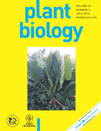
PLANT BIOLOGY
Elevating Understanding of Plant SystemsPLANT BIOLOGY is a prestigious academic journal published by Wiley, dedicated to advancing knowledge in the fields of plant science, ecology, and evolutionary biology. With an impressive impact factor and ranking in the Q1 category for Ecology, Evolution, Behavior and Systematics, and Plant Science as of 2023, it stands at the forefront of research dissemination. The journal encompasses a broad scope of plant biology topics, providing a critical platform for researchers to share innovative findings and foster interdisciplinary collaboration. Available in both print (ISSN: 1435-8603) and online formats (E-ISSN: 1438-8677), it ensures accessibility through open access options. As a crucial resource for professionals, researchers, and students alike, PLANT BIOLOGY cultivates a deeper understanding of plant systems and their ecological significance, making it an essential addition to the library of anyone dedicated to the study of biology and the environment.
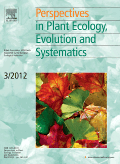
PERSPECTIVES IN PLANT ECOLOGY EVOLUTION AND SYSTEMATICS
Fostering Dialogue in Plant Science ResearchPERSPECTIVES IN PLANT ECOLOGY, EVOLUTION AND SYSTEMATICS is a premier scientific journal published by Elsevier GmbH, dedicated to advancing knowledge and understanding in the fields of plant ecology, evolution, and systematics. With an impressive impact factor and a solid reputation within the top quartile (Q1) of both Ecology and Plant Science categories, this journal ranks among the elite, positioned 100th out of 721 journals in its field, reflecting its significant contribution to ongoing research and academic dialogue. Established in 1998 and converging through to 2024, this journal not only serves as a crucial platform for researchers, professionals, and students alike but also emphasizes innovative methodologies and interdisciplinary approaches to address pressing environmental issues. Although it follows a traditional access model, the wealth of rigorous peer-reviewed articles available will engage the scientific community and facilitate advancements in understanding plant diversity and ecological interactions.

NEW ZEALAND JOURNAL OF BOTANY
Connecting Researchers to the Heart of BotanyThe New Zealand Journal of Botany, published by the esteemed Taylor & Francis Ltd, serves as a pivotal platform for disseminating significant research in the fields of Ecology, Evolution, Behavior and Systematics, as well as Plant Science. With a rich history dating back to 1963 and an impressive convergence extending to 2024, this journal has established itself as an essential resource for researchers and professionals dedicated to understanding the complexities of plant life and ecological systems in New Zealand and beyond. The journal is currently categorized in the Q3 quartile for both relevant disciplines as of 2023, reflecting its balanced influence within the global academic community. Although not an open access journal, it retains a significant impact factor, evidenced by its Scopus rankings, which place it within the top half of its categories. This makes it an invaluable tool for students, researchers, and academics aiming to engage with robust, peer-reviewed scientific findings and contribute to the evolving discourse surrounding botany and ecological research.